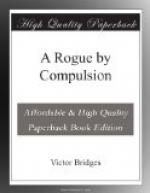He listened to me for the most part in silence, but the few interruptions that he did make showed the almost fierce attention with which he was following my story. I don’t think his eyes ever left my face from the first word to the last.
When I had finished he sat on for perhaps a minute without speaking. Then very deliberately he leaned across and held out his hand.
We exchanged grips, and for once in my life I found a man whose fingers seemed as strong as my own.
“I don’t know whether that makes you an accessory after the fact,” I said. “I believe it’s about eighteen months for being civil to an escaped convict.”
He let go my hand, and getting up from his seat leaned back against the door of the cabin facing us both.
“You may be an escaped convict, Mr. Lyndon,” he said slowly, “but if you choose I believe you can do more for England than any man alive.”
There was a short pause.
“It seems to me,” interrupted Tommy, “that England is a little bit in Neil’s debt already.”
“That doesn’t matter,” I observed generously. “Let’s hear what Mr. Latimer has got to say.” I turned to him. “Who are McMurtrie and Savaroff?” I asked, “and what the devil’s the meaning of it all?”
“The meaning is plain enough to a certain point,” he answered. “I haven’t the least doubt that they intend to sell the secret of your powder to Germany, just as they’ve sold their other information. If I knew for certain it was only that, I should act, and act at once.”
He stopped.
“Well?” I said.
“I believe there’s something more behind it—something we’ve got to find out before we strike. For the last two months Germany has taken a tone towards us diplomatically that can only have one explanation. They mean to get their way or fight, and if it comes to a fight they’re under the impression they’re going to beat us.”
“And you really believe McMurtrie and Savaroff are responsible for their optimism?” I asked a little incredulously.
Latimer nodded. “Dr. McMurtrie,” he said in his quiet drawl, “is the most dangerous man in Europe. He is partly English and partly Russian by birth. At one time he used to be court physician at St. Petersburg. Savaroff is a German Pole—his real name is Vassiloff. Between them they were largely responsible for the early disasters in the Japanese war.”
For a moment no one spoke. Then Tommy leaned forward. “I say, Latimer,” he exclaimed, “is this serious history?”
“The Russian Government,” replied Latimer, “are most certainly under that impression.”
“But if they know about it,” I objected, “how is it that McMurtrie and Savaroff aren’t in Siberia? I’ve never heard that the Russians are particularly tender-hearted where traitors are concerned.”




